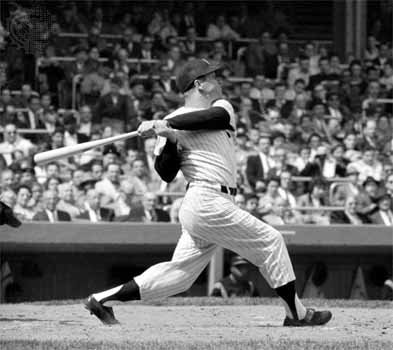When you talk to fans who grew up in the Sixties, many of them chose between Sport magazine and Sports Illustrated in the same way that Rock N Roll fans picked either the Beatles or the Stones. Sport was a monthly, SI a weekly. There was no pretense about Sport–the writing was lunch pale, no frills and featured writers from around the country. The photography was wonderful too. When Andres LaGuerre took over SI, it became literate, the New Yorker of sport magazines. No matter which you prefer, together, they helped define a golden age of sports magazine writing.
The launching of the SI Vault earlier this year was a terrific occasion for all of us who love sports writing, although navigating the site is still a painful and frustrating experience. Sport hasn’t been around in years, but they do have a website and recently, a handful of articles have been posted, including this 1953 profile on Mickey Mantle by Milton Gross:
There have been few more exciting rookies than Mantle was in 1951. Yet Mickey could have become one of the greatest busts simply because he had had so much ballyhoo. Until the end of last season there were many who viewed Mantle with misgivings, because he was a kid who was asked to walk before he could crawl and run before he could walk in baseball. There was question of his maturity for a role so large as the one in which he was being cast and it is entirely possible that what veered Robinson so firmly in his praise of Mantle was not what Mickey did over the entire Series, but his reactions on just one play.
It happened in the third game of the Series, a game the Dodgers were to win to take a two‑games‑to‑one edge, but it is entirely possible that the Series was decided right there in the Yankees’ favor as Mantle met and passed his most severe test. In the eighth inning, Robinson slashed a single to center. As Robinson made a sharp swerve around first base, Mickey fielded the ball on one hop and then was faced with a choice that every National League outfielder has had to make. He could throw to second, forcing Robinson to retreat to first base, or hold his throw until Jackie had committed himself irrevocably when it would be Mantle’s arm against Jackie’s speed, daring and know‑how on the bases. When it is you against Robinson, it is no simple decision to make.
Mantle elected to hold his throw. Whether it was a deliberate or instinctive decision, none can say, but Mantle watched Robinson and Jackie, watching the fielder, came as much as 25 feet toward second. He slowed down, pretending to go back and Mickey, meanwhile, came in several steps with the ball before cocking his arm as if to throw to first base.
With that motion Jackie went into high gear for second, yet Mantle still held his throw. Suddenly, it seemed Jackie sensed he could not make the base. The Dodger stopped, stumbled, got to his feet again and then scrambled back to first.
It was a war of nerves on the bases, Robinson drawing on his years of experience and Mantle drawing from some inexplicable well of wisdom that seems to be his despite his youth, and it was a war Robinson lost.
Among the 66,698 spectators at the Yankee Stadium that day were some who sensed the importance of the play as it related to the Series, but at least one among them, Branch Rickey, interpreted Mantle’s reaction to Robinson’s maneuvering in a much broader sense. Rickey brought Robinson to the majors and many times saw how Robinson’s running could kill the confidence of one man and, through him, his team. As the play unfolded Rickey turned to his companion and said: "Maturity is something that cannot be measured in years. That young man’s arms and legs and eyes and wind are young, but his head is old. To me it is the final proof of the boy. Mantle has the chance to make us forget every ballplayer we ever saw."
For more on Sport, check out Mark Armour’s 2007 tribute over at The Baseball Analysts.



